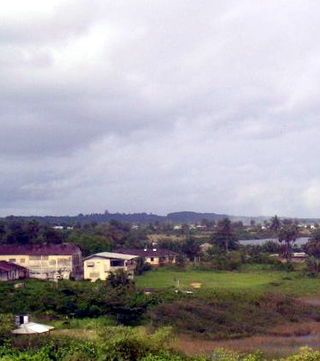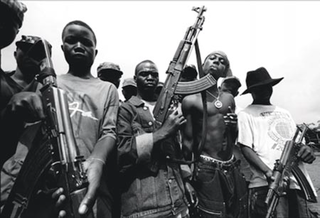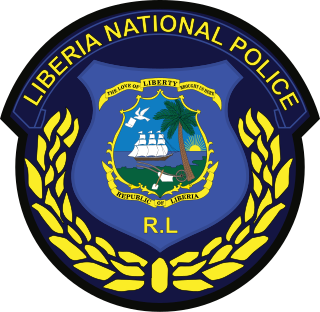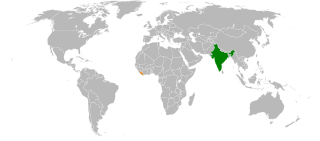
Liberia, officially the Republic of Liberia, is a country on the West African coast. It is bordered by Sierra Leone to its northwest, Guinea to its north, Ivory Coast to its east, and the Atlantic Ocean to its south and southwest. It has a population of around 5 million and covers an area of 43,000 square miles (111,369 km2). English is the official language, but over 20 indigenous languages are spoken, reflecting the country's ethnic and cultural diversity. The country's capital and largest city is Monrovia.

Liberia is a country in West Africa founded by free people of color from the United States. The emigration of African Americans, both free and recently emancipated, was funded and organized by the American Colonization Society (ACS). The mortality rate of these settlers was the highest among settlements reported with modern recordkeeping. Of the 4,571 emigrants who arrived in Liberia between 1820 and 1843, only 1,819 survived (39.8%).

The Armed Forces of Liberia (AFL) are the armed forces of the Republic of Liberia. Tracing its origins to a militia that was formed by the first black colonists in what is now Liberia, it was founded as the Liberian Frontier Force in 1908, and retitled in 1956. For almost all of its history, the AFL has received considerable materiel and training assistance from the United States. For most of the 1941–89 period, training was largely provided by U.S. advisers, though this assistance has not prevented the same generally low levels of effectiveness common to most of the armed forces in the developing world.

Monrovia is the capital city of the West African country of Liberia. Founded in 1822, it is located on Cape Mesurado on the Atlantic coast and as of the 2008 census had 1,010,970 residents, home to 29% of Liberia’s total population. As the nation's primate city, Monrovia is the country's economic, financial and cultural center; its economy is primarily centered on its harbor and its role as the seat of Liberian government.

The Liberians United for Reconciliation and Democracy (LURD) was a rebel group in Liberia that was active from 1999 until the resignation of Charles Taylor ended the Second Liberian Civil War in 2003. While the group formally dissolved after the war, the interpersonal linkages of the civil war era remain a key force in internal Liberian politics.

General elections were held in Liberia on 11 October 2005, with a runoff election for the presidency held on 8 November. The presidency and all seats in the House of Representatives and Senate were up for election. The elections were the first held since 1997 and marked the end of the political transition following the second civil war, having been stipulated in the Accra Comprehensive Peace Agreement of 2004. Ellen Johnson Sirleaf, former World Bank employee and Liberian finance minister, won the presidential contest and became the first democratically elected female African head of state in January 2006.

Harper, situated on Cape Palmas, is the capital of Maryland County in Liberia. It is a coastal town situated between the Atlantic Ocean and the Hoffman River. Harper is Liberia's 11th largest town, with a population of 17,837.

The First Liberian Civil War was the first in a series of two civil wars within the West African nation of Liberia. It lasted from 1989 to 1997. President Samuel Doe had established a regime in 1980 but totalitarianism and corruption led to unpopularity and the withdrawal of support from the United States by the late 1980s. The National Patriotic Front of Liberia (NPFL) led by Charles Taylor invaded Liberia from the Ivory Coast to overthrow Doe in December 1989 and gained control over most of the country within a year. Doe was captured and executed by the Independent National Patriotic Front of Liberia (INPFL), a splinter faction of the NPFL led by Prince Johnson, in September 1990. The NPFL and INPFL fought each other for control of the capital city, Monrovia and against the Armed Forces of Liberia and pro-Doe United Liberation Movement of Liberia for Democracy. Peace negotiations and foreign involvement led to a ceasefire in 1995 but fighting continued until a peace agreement between the main factions occurred in August 1996. Taylor was elected President of Liberia following the 1997 Liberian general election and entered office in August of the same year.

The Second Liberian Civil War was a conflict in the West African nation of Liberia that lasted from 1999 to 2003. It was preceded by the First Liberian Civil War, which ended in 1996.

Chea Job Cheapoo, Sr. was a Liberian politician who served as the 15th Chief Justice of Liberia from July 1987 until his impeachment and removal from office on December 2 of that year. His full rights were later restored by an act of legislature.

The United Nations Mission in Liberia (UNMIL) was a peacekeeping operation established in September 2003 to monitor a ceasefire agreement in Liberia following the resignation of President Charles Taylor and the conclusion of the Second Liberian Civil War (1999–2003). At its peak it consisted of up to 15,000 U.N. military personnel and 1,115 police officers, along with civilian political advisors and aid workers.
Dr. Harry Fumba Moniba was a politician in Liberia hailing from the northwestern county of Lofa. He was the 26th vice president of Liberia from 1984 to September 1990 under the banner of the National Democratic Party of Liberia and ran for president in 1997. He planned to run in the 2005 Liberian presidential election but was killed in a 2-car accident in Michigan on 24 November 2004. He was afforded one of the largest state funerals in Liberian history. He left behind his wife Minita, and their five children. His burial site was contested with several groups of Liberians threatening violence were he not buried in his home county, while others advocated his burial on the grounds of the national gravesite. His family decided to place his remains in the compound of their suburban Monrovia home. Two funerals were held in honor of Dr. Moniba: one in the United States and one in his home country of Liberia. At the U.S. funeral, Dr. Moniba's widow (Minita) was presented with the United States flag by Congressman Nick Smith. The flag had been flown at half mast over the U.S Capitol, making him the only Liberian in history to receive such an honor. The Congressman stated, "Dr. Moniba loved his country, and worked tirelessly to establish peace and prosperity for Liberia. He understood well the true role of a politician in a democratic society." A room was dedicated in Dr. Moniba's honor at the Liberian Embassy in Washington D.C. in February 2007. He also has a primary school named in his honor in Monrovia, Liberia.

The Liberian National Police is the national police force in Liberia. The LNP's mandate is:
A new civil war began in 1999 when a rebel group backed by the government of neighboring Guinea, the Liberians United for Reconciliation and Democracy (LURD), emerged in northern Liberia. By the spring of 2001, they were posing a major threat to the Taylor government. Liberia was now engaged in a complex three-way conflict with Sierra Leone and the Guinea Republic. By the beginning of 2002, both of these countries were supporting the latest addition to the lexicon of Liberian guerrilla outfits – Liberians United for Reconciliation and Democracy (LURD), while Taylor was supporting various opposition factions in both countries. By supporting Sierra Leonean rebels, Taylor also drew the enmity of the British and Americans.

India–Liberia relations are the foreign relations between India and the Republic of Liberia. India is represented in Liberia through its embassy in Abidjan and an active honorary consulate in Monrovia since 1984. Liberia was represented in India through its resident mission in New Delhi which subsequently closed due to budgetary constraints.

General elections were held in Liberia on 11 October 2011, with a second round of the presidential election on 8 November. The presidency, as well as all seats in the House of Representatives and half of the seats in the Senate, were up for election. The election was overseen by the National Elections Commission (NEC).

United Nations Security Council Resolution 1938, adopted unanimously on September 15, 2010, after recalling previous resolutions on the situation in Liberia, including resolutions 1509 (2003), 1626 (2005), 1836 (2005) and 1885 (2009), the Council extended the mandate of the United Nations Mission in Liberia (UNMIL) for a further twelve months until September 30, 2011 and required it to provide electoral assistance.
The Accra Comprehensive Peace Agreement or Accra Peace Agreement was the final peace agreement in the Second Liberian Civil War. It was signed on 18 August 2003 in Accra, Ghana. It was created following the signing of a ceasefire agreement on 17 June 2003 and "intensive back-door negotiations" beginning on 4 June in Akosombo, Ghana.
The following is a timeline of the history of the city of Monrovia, Liberia.













